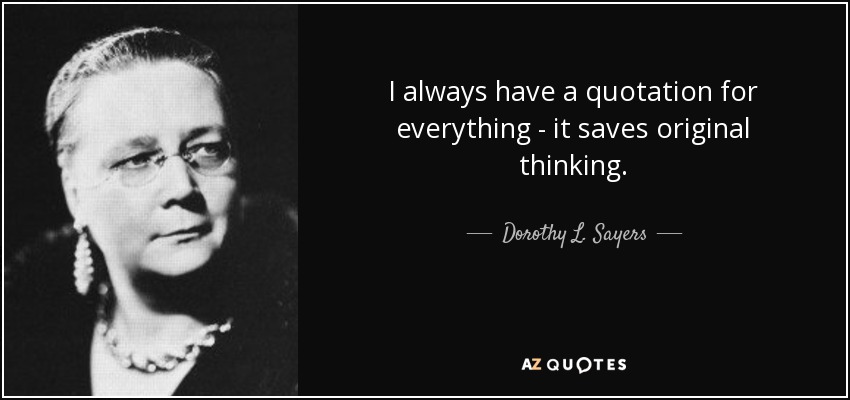
A therapist once chided me, in a therapists’ way, for using too many quotations in our sessions. The point was that quotations are often used in lieu of substance, something real, be it thought or emotion. I explained that, for me, quotations served a different role.
Often in previous years I would use quotations just because I liked them and wanted to share them. Indeed, a friend of mine bought me a book of quotations noting how often I would use them. Buried within them, or perhaps coming later, was the different reason why I would use quotations. Quotations, for me, are often a form of shorthand. Instead of floundering to find the right words to express my thoughts and feelings, I would stand upon the shoulders of giants (tee hee) and use their articulation to get my thoughts across. Often, I later realised, my reason for doing so was lost in the thought, ‘oh, it is a quotation, what has this got to do with what we are talking about?’. Later, I would have quotations on the wall of my workplaces. This I did to use as cues. Having noted that when experiencing negative emotions, I would have to go through the proverbial journey to eventually reach a point which could be expressed more elegantly by others before, I mapped my emotional responses and found which quotation, for example, I would find to explain the situation or get me back into the mental state I wanted to be in. In this way, the quotations served as shortcuts of the journey to arrive where I knew I would eventually arrive at. Seeing them, they triggered the thought process, and I was able to do in a few moments what might, previously, take 30 minutes or so to do so.
This use of quotations is frowned upon in academia. In academia the prevailing emotion is fear. People live in fear of being misunderstood or criticised or, even worse, face the suggestion that they may be wrong! (the horror, the horror). With this in mind, in academia you have to understand and explain exactly what Kant or Goethe, or people who aren’t German meant, so that you can then use the quotation. To say, ‘to use the words of Kafka, but not the meaning…’, is frowned upon as it does not fit nicely into the academic concept of what a quotation is.
Quotations permeate daily life. The internet is full of them from self-help (please like), to ancient wisdom (please like) etc. Often the quotations are either misappropriated to an individual or just wrong. There are many, many, false quotations in the public sphere. Some quotations are 100% accurate and authentic. For example, a Twitter conversation I saw between Jesus Christ and Leonardo Da Vinci in relation to Da Vinci’s historical errors when painting The Last Supper (to save time reading it, I will summarise- Da Vinci used the wrong type of butter and Jesus is shown wearing sandals when he claims, in his tweets, that he was wearing Adidas flip flops as endorsed by Lionel Messi.) but often the quotations are wrong. This can be dangerous for a number of reasons.
- People may use them to justify bad behaviour
When Nietzsche said that what is done out of love takes place beyond good and evil, some can see it as an excuse for abuse. Many abusers state that they do what they do out of love (for your own good), when it is objectively, axiomatically, bad behaviour
2. People mistake words for wisdom and knowledge
Not seeing words in context, people often think that they understand them. This can lead to problems as they superimpose their own meanings on them and, as with 1, use them to justify opinions, behaviours etc. which are damaging
Plato, the great philosopher, bemoaned the advent of the written word as he foresaw the dangers that would come from mistaking the ability to write and read words with the accumulation of actual knowledge. Language is merely a tool, whereas wisdom is that which guides the tool. If one reads comments put under quotations on the internet, one sees how the celebrity of the speaker drowns out the critical faculties of the reader, and thus, as Oscar Wilde wittily (I’ve never used that word before) noted;
‘Most people are other people. Their thoughts are someone else’s opinions, their lives a mimicry, their passions a quotation.’
meaning that one never becomes who one is as one is shaped by their environment and their thoughts, which determine in a great part who we are, are just the echoes of other words passed down since the dawn of civilisation, containing all of the errors called ‘truth’ within.
‘till next time



